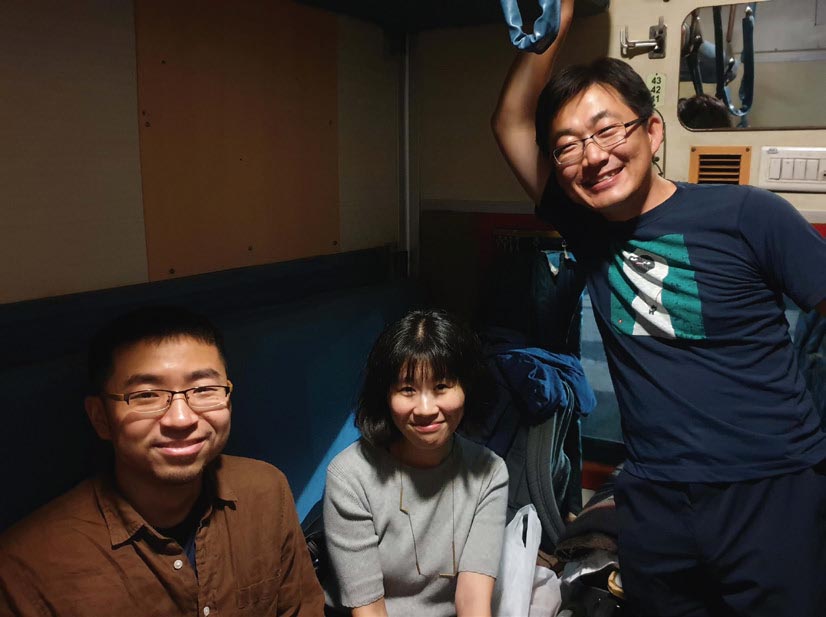An 8-hour stay in Nagaland
On 27 November 2019, I landed at Dimapur Airport in Nagaland, in northeastern India, to participate in UKNA’s symposium 'Ambivalent Infrastructures'. There were many others attending the conference, and the small airport was buzzing with foreigners from across the world. We were excited to have arrived, but that is when our strange experience began.
Dimapur airport
Foreigners visiting three of India’s northeastern states (Nagaland, Manipur, and Mizoram) are required to register at the local police station upon arrival. In recent years it has become easier for foreigners to travel to this region, with the exception of Pakistani, Bangladeshi, and Chinese nationals; they still need special permission. Therefore, as a Chinese national living in Japan, I contacted the Indian consulate in Tokyo before travelling, and they advised me of all the necessary documents. Then, during my layover at Kolkata airport, I mentioned my destination to the immigration officer, but he waved me through without comment. At this point, I was confident that all my documents were in order, and I would have no trouble reaching Dimapur.
Upon arriving at Dimapur airport, everyone presented their passports to the airport police, as had been instructed. All passports were quickly returned to our group, except for the Chinese passports. There was no problem with the visa; the only problem was our nationality. Having registered with the police, further action was apparently required. The airport police were clearly uncomfortable, and were not quite sure how to proceed. The local (symposium) staff soon started negotiating in local languages on our behalf (Nagaland is known for its diverse ethnicities and languages); they explained that we had an official invitation letter from the Chief Secretary of Nagaland, that the state government had promised freedom of activities for the participants, and that we had a visa issued by the Indian consulate. After waiting for more than an hour, a police officer informed us that they could not make a decision and that we had to go to a police station in the city. We were escorted by local staff and a policeman on a scooter.
City police station
Twenty minutes later, we arrived at Dimapur East Police Station, which turned out to be just opposite our hotel. So we first dropped off our luggage, and then headed over to the police station, accompanied by a few Indian scholars and the local staff. Eventually, an officer returned our passports with a smile, but it was still not certain if we would be granted permission to stay. We excitedly talked about the history of China and India, appreciating that, with a history of war and many other issues, it is understandable that the police had to keep an eye on Chinese nationals. At the same time, we thought, Nagaland is far away from the conflict areas between China and India and there are no official regulations to prohibit any Chinese from coming. Otherwise, surely, we would have been stopped at Dimapur airport, or even in Kolkata. Nevertheless, soon after, the final decision came that we had to leave the state within 24 hours.
At this time, the airport had already closed and the only way to leave was by train or car, so we assumed we would stay the night and catch a flight the next day. Later that evening, however, the local staff explained we had to leave Nagaland by night train and that the police had already arranged our tickets. Perhaps they wanted to rid themselves of an awkward situation as soon as possible. The train would take us to Guwahati, the capital city of Assam state where foreigners can stay without registration. From there, we could easily reach Delhi or Kolkata. The police officers gracefully allowed us to wait in the hotel lobby until departure time.
After learning about our situation, the symposium organizers were furious and suggested that all participants should move to Assam. Realizing that this was impracticable, they looked into the possibility of holding the meeting in a town just across the Nagaland border. However, this might even be more troubling to the police if they knew that the three Chinese nationals would be 'active' right at the border. Moreover, although it would only be a twenty-minute drive from Dimapur, the Chinese scholars would have to travel by train from Guwahati, a further six hours away. We agreed that it was all too much and, unfortunately, we had to accept that we could not attend the conference.
Dimapur station
A police officer accompanied us to the railway station, apologizing many times in English. His comment, "I am sorry to let you have such an experience in this corner of the world", was unforgettable. We arrived at the railway station at 20:30; a shabby train was waiting at a platform crowded with people waiting to board. It was a disheartening sight. Two police officers who awaited us handed us our train tickets, and then took a group photo as proof that we had left the state. After that, the police were so kind as to arrange a private, quiet and comfortable place for us to rest before boarding.

Catching the night train out of Nagaland
When we boarded our sleeper coach, many colleagues escorted us to our seats. It was heartwarming, but our feelings were otherwise mixed; we had been expecting academic discussions at the conference and instead were confronted with an unexpected expulsion. The train started moving slowly, and the police officers waved us goodbye. Three Chinese who did not know each other 8 hours previously, embarked on a journey together to a strange place. But that is a story for another time.
Zhe Ren, Institute of Developing Economies, Japan External Trade Organization (JETRO)